Despite its flexibility and robust feature set, Shopware might not be an excellent fit for some businesses due to the heavy development and price tag. If you’re searching for a Shopware alternative to manage better and grow your store, you’ve come to the right place. LitExtension will list the best alternatives and competitors to Shopware in this blog.
Here is the list of the best Shopware alternatives we’re examining today:
- Shopify
- BigCommerce
- Salesforce Commerce Cloud
- Ecwid
- WooCommerce
- Adobe Commerce (or Magento)
- PrestaShop
- Drupal Commerce
- commercetools
- OpenCart
- Wix
- nopCommerce
Check out our Shopware Review first if you’re new to Shopware and want more detailed info about its pricing, features, pros & cons. But if you are ready for another Shopware alternative, let's get started right away!
Best Shopware Alternatives – Which Is For You
If you're considering a switch from Shopware or exploring other eCommerce solutions, here are our recommendations for you:
- Shopify is great for beginners and businesses of all sizes. It is easy to use and offers everything you need in one place.
- BigCommerce has powerful features with API access, which is great for growing businesses.
- Salesforce Commerce Cloud is a top choice for large enterprises with complex needs.
- Ecwid is simple and affordable, which is perfect for small shops.
- WooCommerce is flexible and customizable, ideal for those with a WordPress website.
- Magento Open Source is highly customizable but requires technical expertise.
- PrestaShop is free and open-sourced, making it a good option for those on a tight budget.
- Drupal Commerce is another open-source option, highly flexible but requires technical knowledge.
- commercetools is a headless platform, offering maximum flexibility, but it is best suited for experienced developers.
- OpenCart is a popular open-source eCommerce platform known for its flexibility and cost-effectiveness.
- Wix is a popular website builder that also offers eCommerce features.
- nopCommerce is an open-source eCommerce platform known for its flexibility and comprehensive feature set.
In the latter parts of our article, let's break down all these Shopware competitors to see what they have up their sleeve.
1. Shopify
Category: Cloud-Based, SaaS (Software as a Service)
Users' ratings of Shopify: 4.4/5 on G2
Shopify is a top eCommerce platform that helps businesses build, customize, and manage online stores easily. With a user-friendly interface, various built-in features, and an extensive App Store, Shopify is one of the best Shopware alternatives for businesses of all sizes.

Core strengths of Shopify:
- Shopify's interface is highly intuitive
- The Shopify App Store has over 8,000 robust eCommerce apps
- Shopify is well-packed with great built-in sales and marketing features.
Why Shopify is among the best Shopware alternatives?
Shopify is easier to use than Shopware, especially if you're new to setting up online stores. It's easy to understand and use, even without technical skills. With Shopify, you can access a broader selection of tools and apps to expand your store's features. There are over 8,000 Shopify apps, while Shopware has just over 1,500 extensions. This means you have more options to customize your store and add functionality.
If you sell to customers worldwide, Shopify makes supporting multiple languages and currencies easier through Shopify Markets. This allows you to create a seamless shopping experience for customers in different countries.
However, consider these factors:
- Shopware may offer more flexibility for custom solutions for users with technical expertise
- Using Shopify can become expensive with additional apps and transaction fees.
Shopify pricing: From $29 to $2,300+ per month
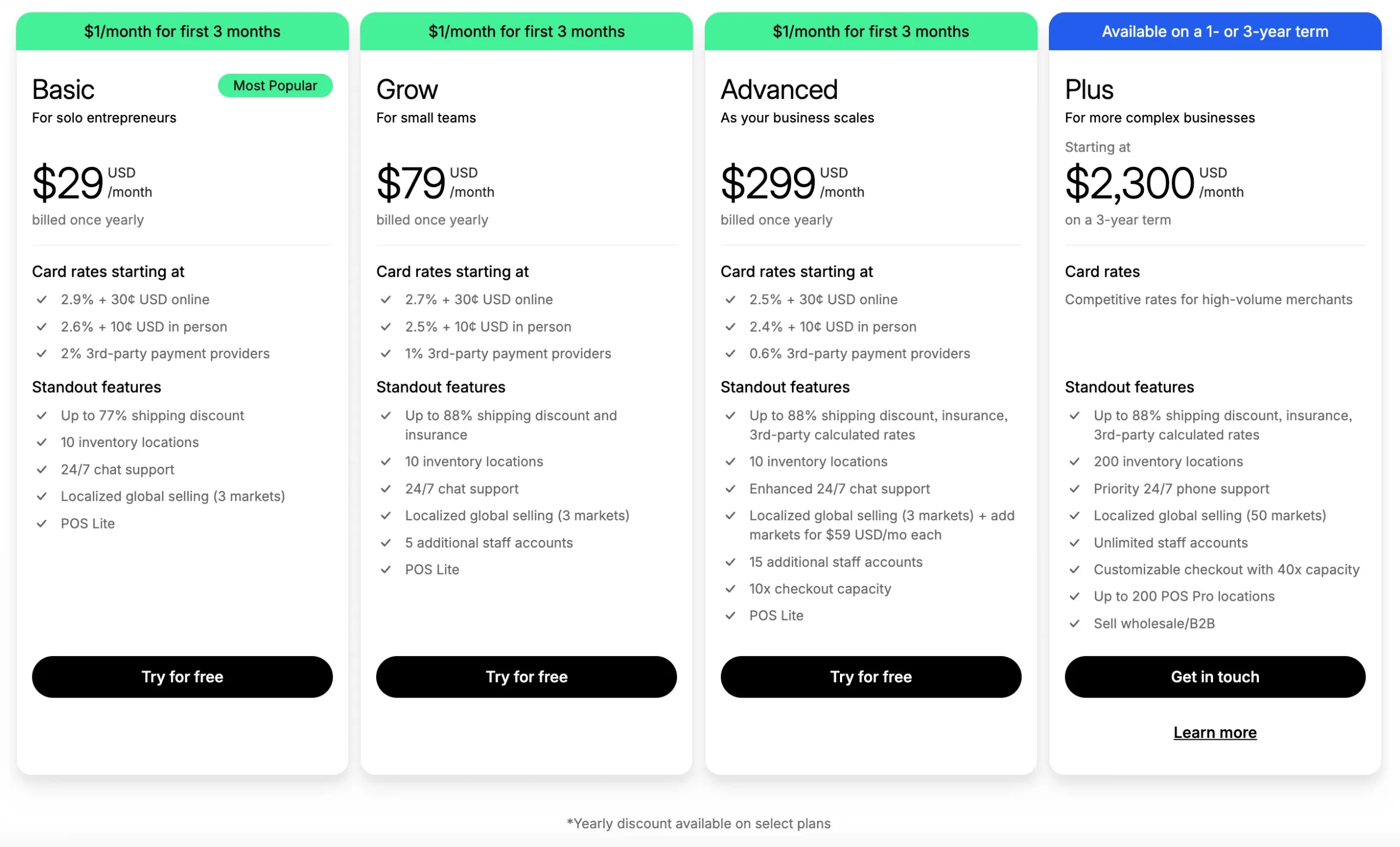
For a full expert insight on this platform, please check out our Shopify review here. And, if you see the great prospects that Shopify brings and want to migrate Shopware to Shopify, LitExtension is the top choice.
Our recommendations for Shopify:
- Best for: Businesses of all sizes looking for an easy-to-use, scalable eCommerce platform.
- Not recommended for: Businesses with high customization requirements.
2. BigCommerce
Category: Cloud-Based, SaaS (Software as a Service)
Users' ratings of BigCommerce: 4.2/5 on G2
BigCommerce is a leading eCommerce platform known for its scalability and comprehensive feature set, making it one of the best Shopware competitors. To name a few, BigCommerce supports multi-channel selling, integrates seamlessly with various third-party applications, and provides robust SEO tools to help enhance your store's visibility.

Core strengths of BigCommerce:
- BigCommerce is famous for its capabilities to support high-volume stores
- Though BigCommerce is a hosted solution, the platform gives you great flexibility through API access
- You can do multi-channel selling across various platforms seamlessly
Why BigCommerce is among the best Shopware alternatives?
BigCommerce makes it simple to open and run your online shop. With easy-to-follow guides and a clear layout, it's easy for anyone to understand, even if you're unfamiliar with technology. BigCommerce provides all the tools you need to sell online right within the platform. This saves you time and effort; you won't need to search for and add extra features from other places.
Unlike Shopware, BigCommerce doesn't charge extra fees when you make a sale, no matter which plan you choose. This means you get to keep more of the money you earn.
However, consider these factors:
- BigCommerce is not as easy to set up as some other hosted platforms
- The platform has limited sales per plan, which could restrict growth
- BigCommerce offers limited SEO capabilities compared to other Shopware competitors.
BigCommerce pricing: From $39 to $399 per month, with a custom plan available for large businesses
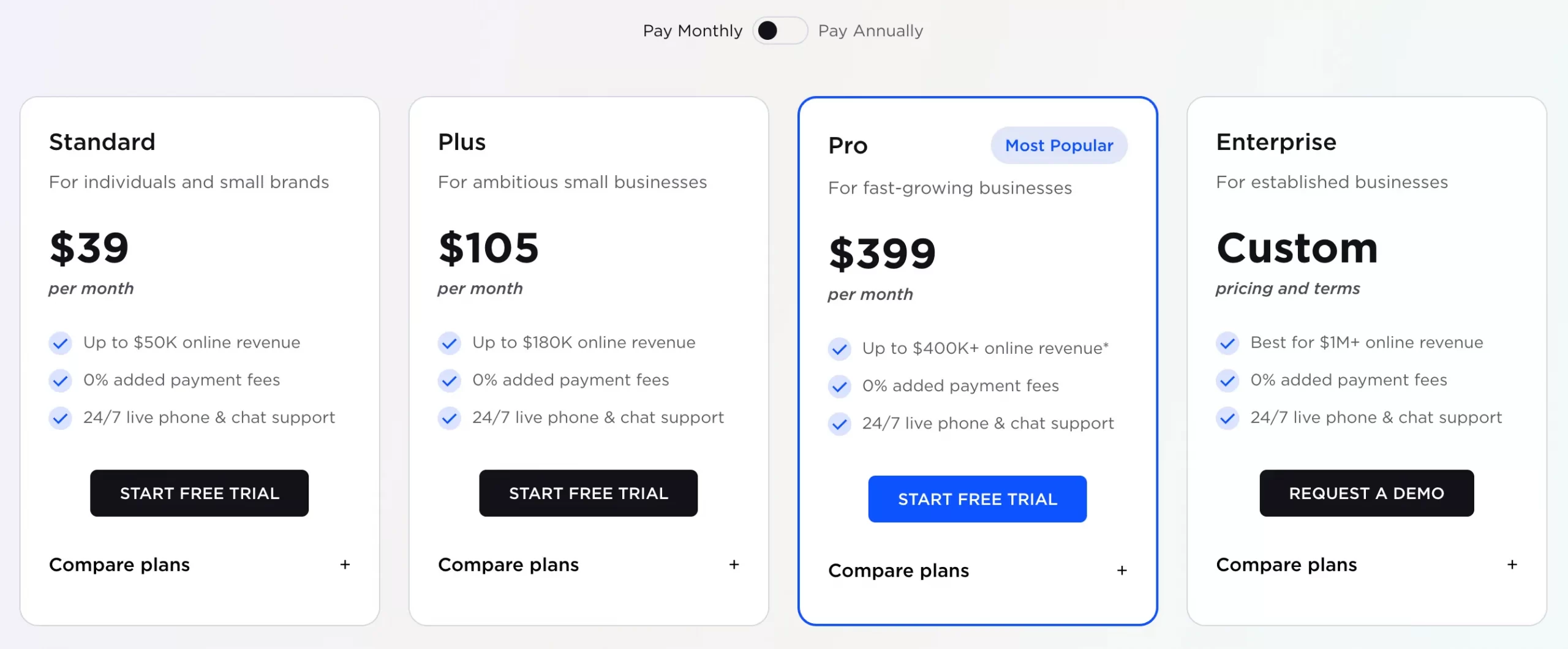
Our recommendations for BigCommerce:
- Best for: Businesses of all sizes looking for a scalable eCommerce platform with strong built-in features
- Not recommended for: Businesses requiring highly specific customizations or those looking for the easiest setup experience
3. Salesforce Commerce Cloud
Category: Cloud-Based, SaaS (Software as a Service)
Users' ratings of Salesforce Commerce Cloud: 4.4/5 on G2
Salesforce Commerce Cloud is a comprehensive eCommerce platform designed to support medium-to-large-sized businesses. Known for its extensive built-in eCommerce features and AI-powered functionalities, Salesforce Commerce Cloud will allow you to run seamless multi-channel retail operations and provide advanced personalization capabilities to your customers.
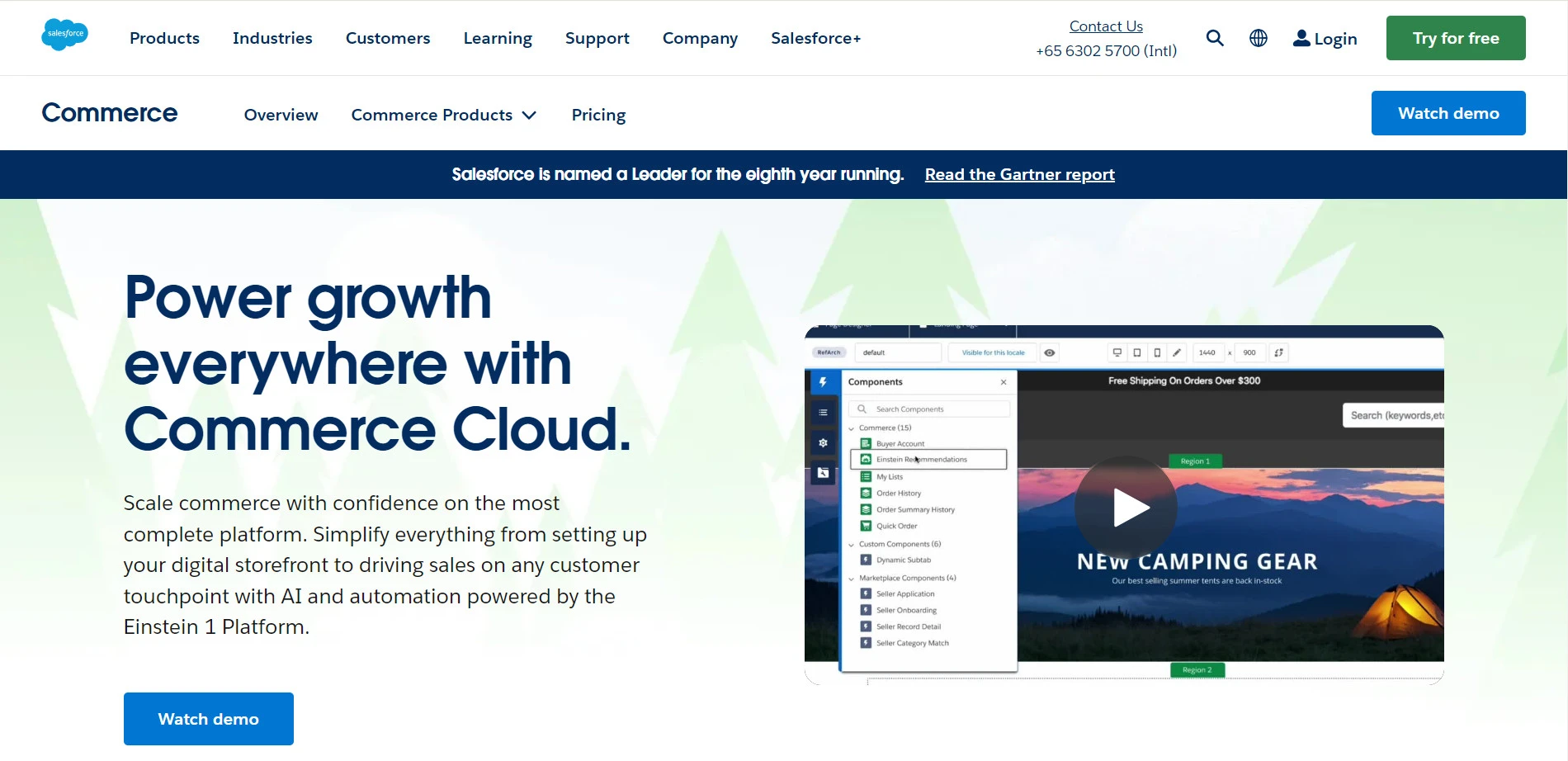
Core strengths of Salesforce Commerce Cloud:
- The platform integrates seamlessly with Salesforce CRM to give you a unified view of your customer data
- You get access to advanced personalization tools for your merchandising and marketing campaigns
- AI-powered recommendations and predictive analytics allow you to optimize your store continuously
Why Salesforce Commerce Cloud is among the best Shopware alternatives?
If you need to manage multiple online stores, Salesforce is easier than Shopware. It's designed for growing businesses with many customers and has better tools for marketing your products and reaching more customers. Salesforce can automatically adjust your product displays, test different versions of your website, and even create special offers for each customer.
When your website gets very busy with many visitors and orders, Salesforce is built to handle it without slowing down. This makes it a reliable choice for growing businesses.
However, consider these factors:
- Salesforce Commerce Cloud can be complex to set up and may require technical expertise
- The platform is more expensive than some other eCommerce solutions, which may not be suitable for smaller budgets
Salesforce Commerce Cloud pricing: 1-2% of Gross Merchandise Value (billed annually)
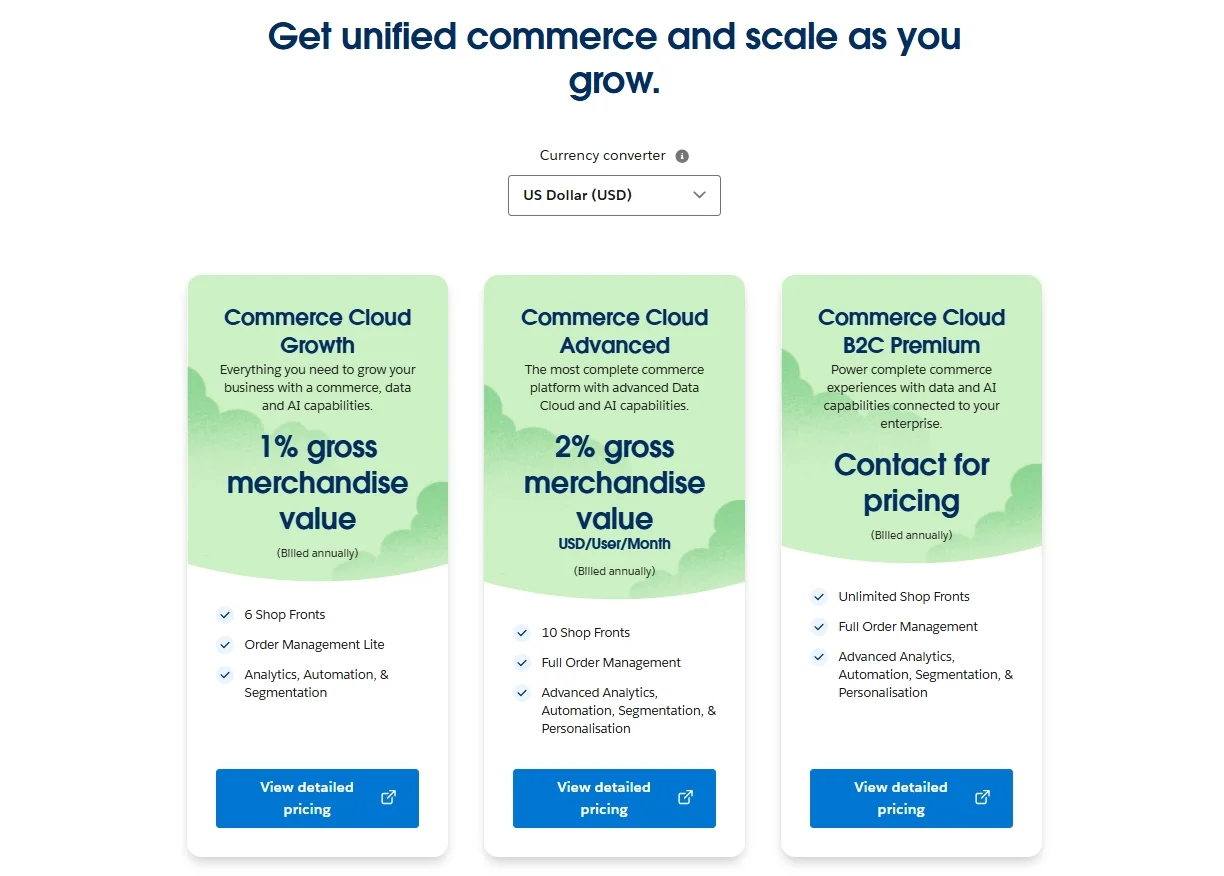
Our recommendations for Salesforce Commerce Cloud:
- Best for: Medium to large-sized businesses looking for a scalable, feature-rich eCommerce platform with strong CRM integration
- Not recommended for: Smaller businesses with tight budgets or simpler needs
4. commercetools
Category: Open source
Users' ratings of commercetools: 4.6/5 on G2
This list would be incomplete without Commercetools, one of the best Shopware alternatives with high flexibility over your e-store.
Thanks to its API-first approach, Commercetools allows businesses to create customized and innovative shopping experiences across various channels. The platform’s modular architecture promises to empower enterprises to integrate their eCommerce store seamlessly with any third-party tools.
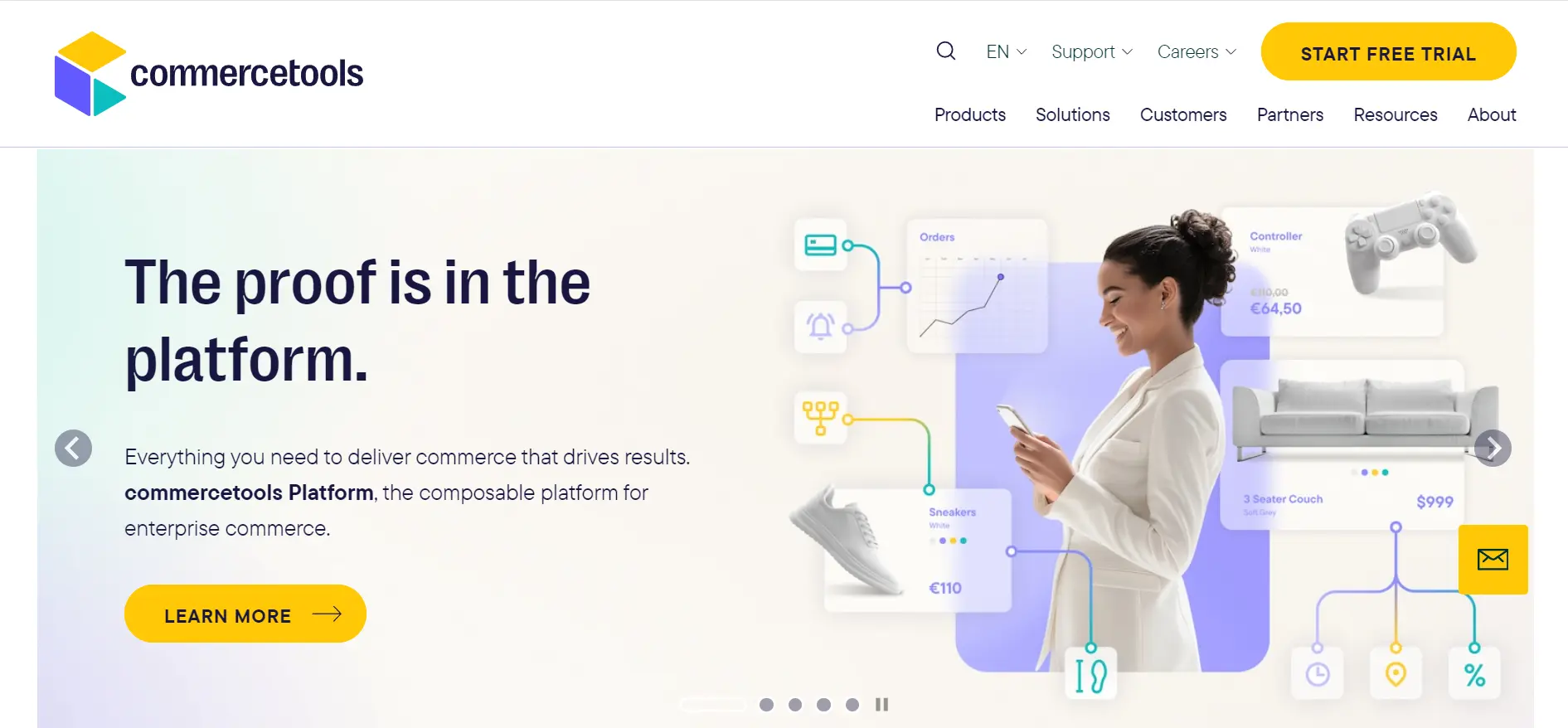
Core strengths of commercetools:
- commercetools offers a highly flexible and scalable API-first platform
- The platform supports multi-channel selling and seamless integration with various touchpoints
- The architecture enables extensive customization through its modular design
- commercetools facilitates innovation with its headless commerce approach
Why commercetools is among the best Shopware alternatives?
Commercetools is an excellent choice for online stores that want to be flexible and grow quickly. It uses a special approach (API-first) that Shopware doesn't do as well. Thanks to its modular and microservices-based architecture, Commercetools supports more extensive customization.
For example, you can independently develop and deploy specific services like payment processing, inventory management, etc., without affecting other system parts.
Commercetools also uses a modern design (headless commerce) that makes creating a fast and smooth shopping experience for your customers easier. This design also helps ensure your store is ready for future changes and updates.
However, consider these factors:
- The initial setup and integration process can be complex and time-consuming
- commercetools can be more expensive due to custom development and integration costs
- You may need to rely on external developers for advanced customizations
commercetools pricing: Custom based on the number of orders processed.
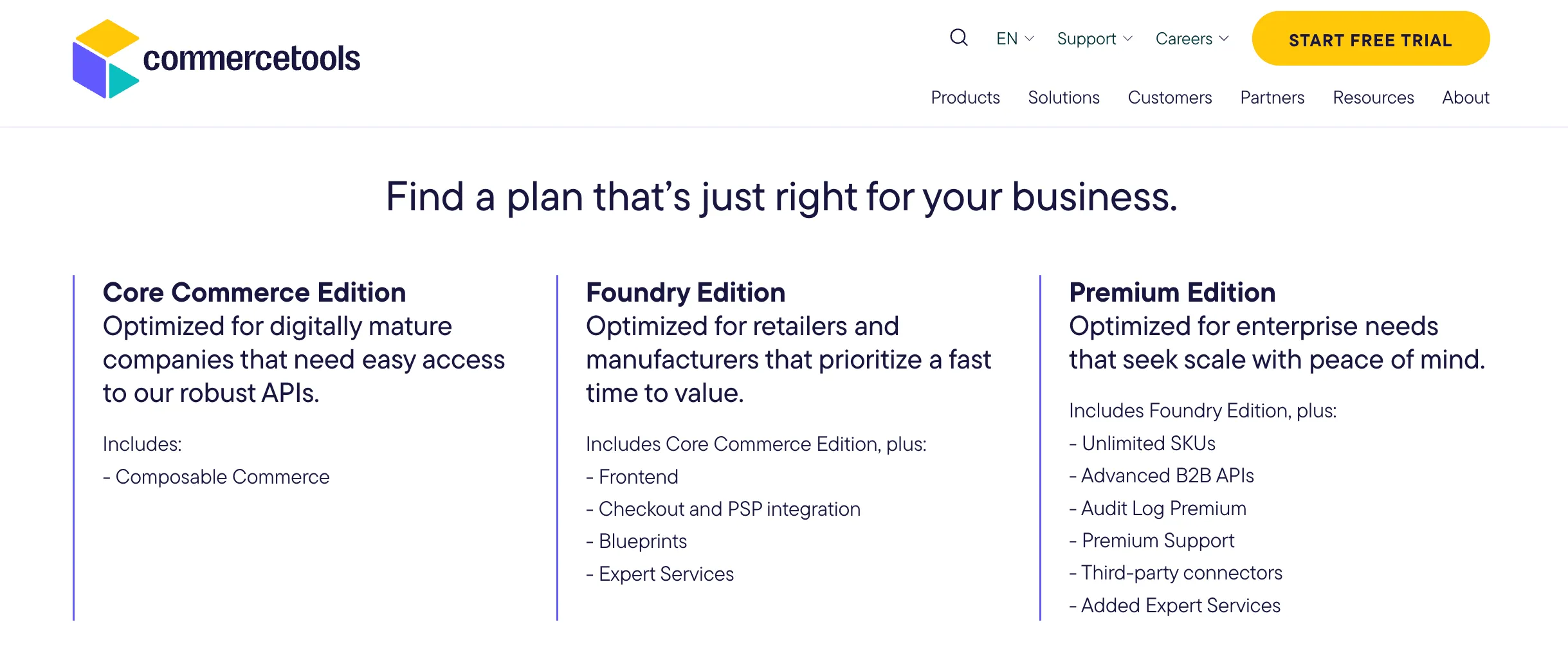
Our recommendations for commercetools:
- Best for: Large enterprises and businesses looking for a highly customizable and scalable eCommerce platform with a headless architecture
- Not recommended for: Small businesses with limited technical expertise
5. Ecwid
Category: SaaS
Users' ratings of Ecwid: 4.7/5 on G2
Next up, I’m going to talk about Ecwid, or “eCommerce Widget,” a flexible eCommerce platform designed to help small businesses set up and manage online stores. What I particularly like about Ecwid is its flexibility as it enables businesses to integrate their store into existing websites, social media channels, and even marketplaces.

Core strengths of Ecwid:
- Ecwid has a free forever plan and does not charge transaction fees on any of its plans
- You can easily add Ecwid eCommerce widgets to your websites, social media, and marketplaces
Why Ecwid is among the best Shopware alternatives?
If you want to save money and sell online quickly, Ecwid is among the best free Shopware alternatives. You can start for free, and even with the paid plans, Ecwid doesn't charge transaction fees on any of its plans, so you keep more profits.
Turning your website into an online store is also simple with Ecwid. It's designed for beginners and is easier to set up than Shopware. If you're looking for a way to sell online without spending a lot or needing technical skills, Ecwid is the perfect solution.
However, consider these factors:
- Ecwid offers limited customization options compared to Shopware
- Advanced features are largely in higher-tier plans, which can increase costs quickly as your store grows
- The platform may lack some third-party tool integrations found in other eCommerce solutions
Ecwid pricing: From $5 to $105 per month
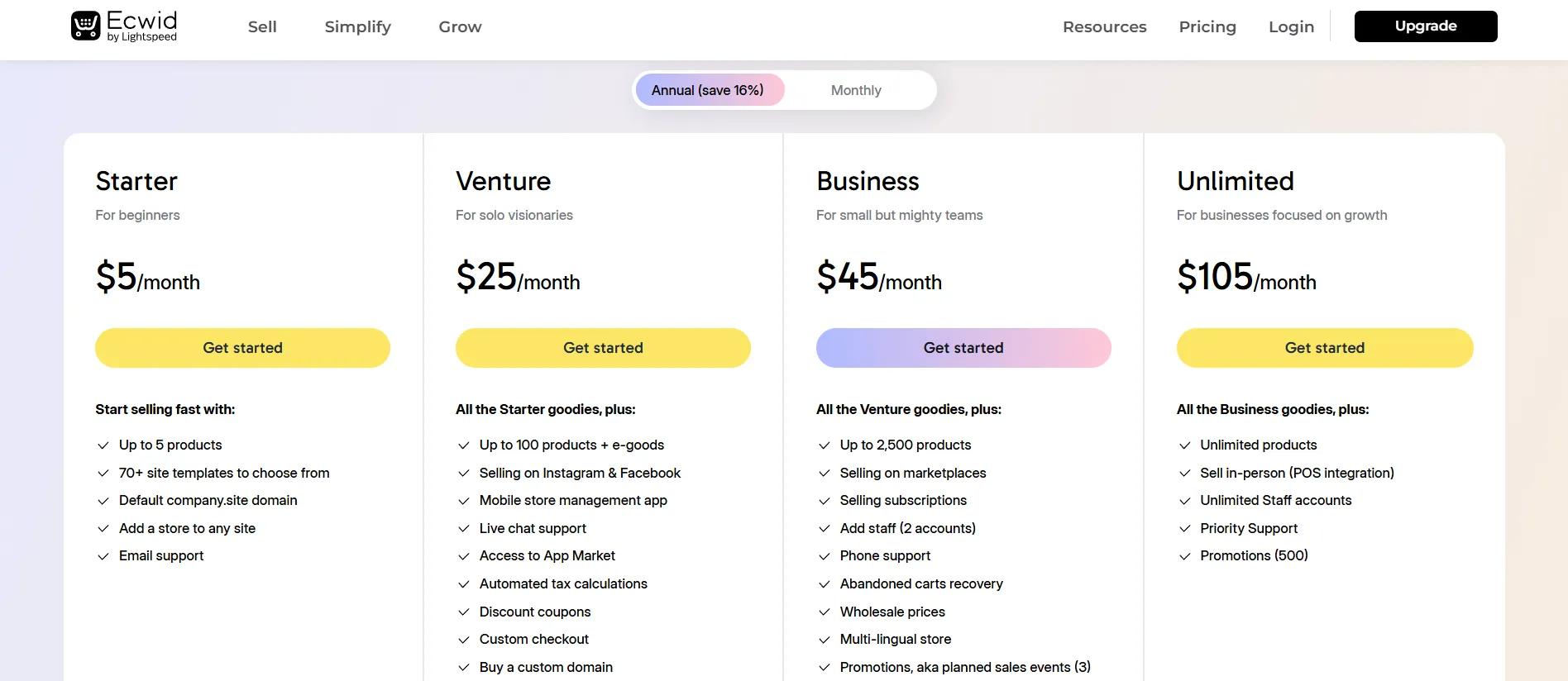
Our recommendations:
- Best for: Small businesses looking for an easy-to-use, flexible eCommerce platform that integrates with existing online presences
- Not recommended for: Large businesses that require extensive customization or a wide range of third-party integrations
6. WooCommerce
Category: Open-source plugin for WordPress
Users' ratings on WooCommerce: 4.4/5 on G2
WooCommerce is the next Shopware alternative I’d like to examine. It is a powerful and flexible eCommerce plugin designed for WordPress websites. Thanks to WooCommerce’s open-source nature and its deep integration with WordPress, the platform is famous for its unlimited customizations and various plugins.
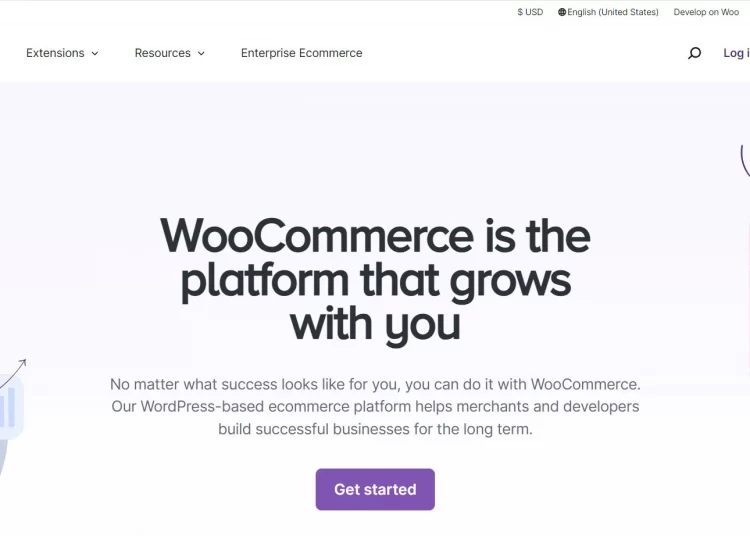
Core strengths of WooCommerce:
- WooCommerce provides extensive flexibility in design and functionality
- The platform integrates directly with WordPress– the most popular CMS worldwide
- WooCommerce supports a wide range of payment gateways
- The platform includes extensive plugin support, allowing you to extend your store functionality as you like.
Why WooCommerce is among the best Shopware alternatives?
WooCommerce is perfect if you want to start selling online without spending any money up front. Because it's built on WordPress, it's great for creating websites that focus on content, like blogs or articles, alongside your products.
With WooCommerce, you have tons of options to make your store look and function exactly how you want it to. Compared to Shopware, there are way more themes and extra plugins available. This gives you much flexibility to create a unique and customized online store.
However, consider these factors:
- The WordPress plugin lacks some of the advanced eCommerce features found in Shopware, like B2B functionalities, multi-site management, and omnichannel support
- From my experience, WooCommerce’s heavy reliance on third-party plugins can lead to potential security risks, compatibility issues, and increased maintenance
WooCommerce pricing: Flexible based on your choice of hosting, extensions, and development service.
Our recommendations for WooCommerce:
- Best for: Businesses already using WordPress or those seeking a highly customizable and flexible eCommerce platform
- Not recommended for: Businesses seeking an all-in-one solution with minimal setup and maintenance requirements
7. Adobe Commerce (or Magento)
Category: Open-source
Users' rating on Adobe Commerce: 4/5 on G2
Magento Open Source will be a great solution if you are looking for a scalable Shopware alternative to cope with your growth. This platform is one of the most robust and highly customizable eCommerce platforms designed for businesses that require extensive flexibility and control over their online stores.
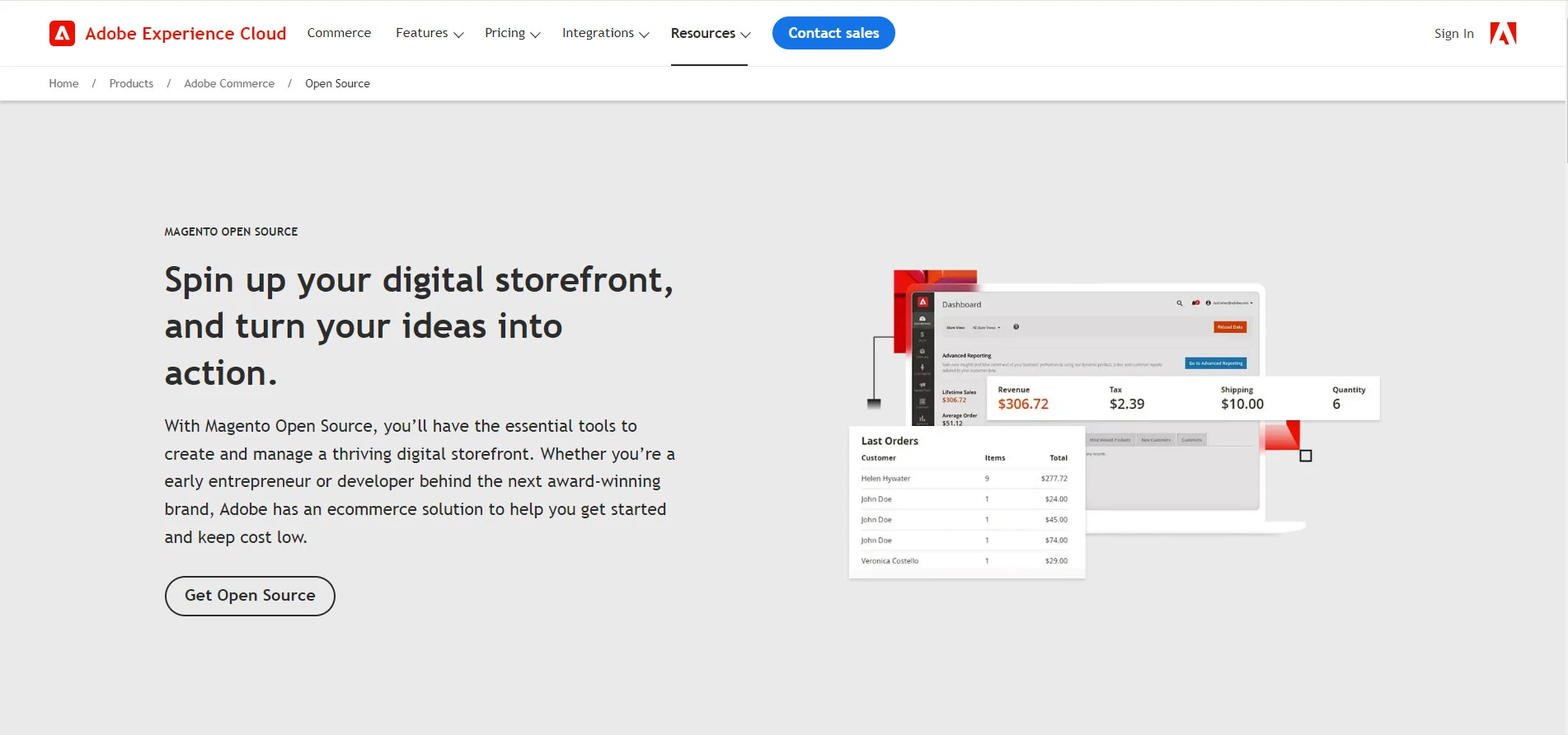
Core strengths of Adobe Commerce:
- Magento provides extensive customization options for design and functionality
- The platform supports a wide range of payment gateways and shipping methods
- Magento offers robust product management features, including complex product types and inventory management
- The platform includes a large ecosystem of extensions and themes
Why Adobe Commerce/Magento is among the best Shopware alternatives?
If you need a powerful online store that you can change to fit your exact needs, Magento is a better choice than Shopware. It's great for selling all types of products, even those with several options and variations. Magento has a massive library of extensions, with over 4,415 compared to Shopware's 1,500+. This means you can easily add new features and functions to your store.
If you need to manage multiple stores at the same time, Magento makes it simple to do this from one central location. It's designed for growing businesses that need a lot of flexibility.
However, consider these factors:
- Magento can suffer from performance issues, particularly in standard hosting environments
- Magento often requires complex and time-consuming upgrades, which can result in significant downtime
Adobe Commerce pricing: Flexible based on your hosting, extensions, and development fee.
Our recommendations on Adobe Commerce:
- Best for: Businesses seeking a highly customizable and flexible eCommerce platform with extensive features
- Not recommended for: Small businesses with limited technical expertise
8. PrestaShop
Category: Open-source
Users' ratings on PrestaShop: 4.3/5 on G2
PrestaShop is a flexible and feature-rich eCommerce platform designed for businesses of all sizes. As PrestaShop supports multiple languages and currencies, it’s the option I highly recommend if you’re looking for a platform with cool internationalization functionalities.

Core strengths of PrestaShop:
- PrestaShop’s open-source nature will give users extensive customization options with multiple languages and currency support
- PrestaShop provides a robust set of product management features, including inventory management and product variations
- The platform includes a large marketplace of modules and themes to extend store capabilities
Why PrestaShop is among the best Shopware alternatives?
Even though PrestaShop is an open-source software, it's simpler to set up a store with PrestaShop than with Shopware. This platform offers over 4,000 modules, more than what Shopware provides, so you have more options to add extra features to your store.
PrestaShop is used by over 300,000 stores globally, much more than the 27,000+ sites using Shopware. This means PrestaShop has a bigger community where you can find help and advice. PrestaShop is especially popular in France, where it has a strong support network. Its headquarters is located in Paris, making it easier to get help in French.
However, consider these factors:
- PrestaShop may require additional modules for certain advanced features, increasing overall costs
- The content management features of PrestaShop are not as advanced and flexible as those of Shopware
PrestaShop pricing: Flexible based on your choice of hosting, extensions, and development service.
Our recommendations for PrestaShop:
- Best for: Businesses looking for a highly customizable platform with a strong presence in France
- Not recommended for: Businesses seeking a solution with more advanced built-in content management features
9. Drupal Commerce
Category: Open-source
Users' ratings on Drupal Commerce: 4/5 on G2

Last but not least, Drupal Commerce is the last Shopware alternative we’d love to examine. Drupal Commerce is one of the best Shopware alternatives, thanks to its flexibility and seamless integration with the Drupal CMS.
Drupal Commerce's core system includes comprehensive product management, a shopping cart, and a checkout process. What I like most about Drupal Commerce is that the platform has fantastic globalization features like language translation, dynamic currency conversion, localized tax, etc.
Core strengths of Drupal Commerce:
- Drupal Commerce offers deep integration with Drupal, which I believe to be quite handy if you want to build a content-driven eCommerce website
- Drupal Commerce supports a wide range of payment gateways and shipping methods
- The platform includes robust product management features and flexible taxonomy systems
Why Drupal Commerce is among the best Shopware alternatives?
If you want to create an online store that is tightly connected to your website content, Drupal Commerce is a great option. It lets you manage your products and website content all in one place.
Drupal Commerce is designed to make your online store run fast and smoothly. It does this by separating the front end (what customers see) from the back end (how your store works), resulting in a better user experience. This is particularly important if you have a large or complex store.
However, consider these factors:
- Drupal Commerce requires significant technical expertise to set up and manage, especially for advanced customizations
- Drupal Commerce may require more frequent maintenance and updates to ensure security and performance
Our recommendations for Drupal Commerce:
- Best for: Businesses seeking a highly customizable and content-driven eCommerce platform with deep integration with Drupal CMS
- Not recommended for: Small businesses with limited technical expertise or those looking for a more straightforward eCommerce solution
10. OpenCart
Category: Open-source
Users' ratings on OpenCart: 4.3/5 on G2
OpenCart is an open-source eCommerce platform that has gained popularity for its simplicity and flexibility. It allows users to set up and manage online stores without requiring extensive technical knowledge. Known for its ease of use and cost-effectiveness, OpenCart offers a range of built-in features, making it a solid choice for small to medium-sized businesses.
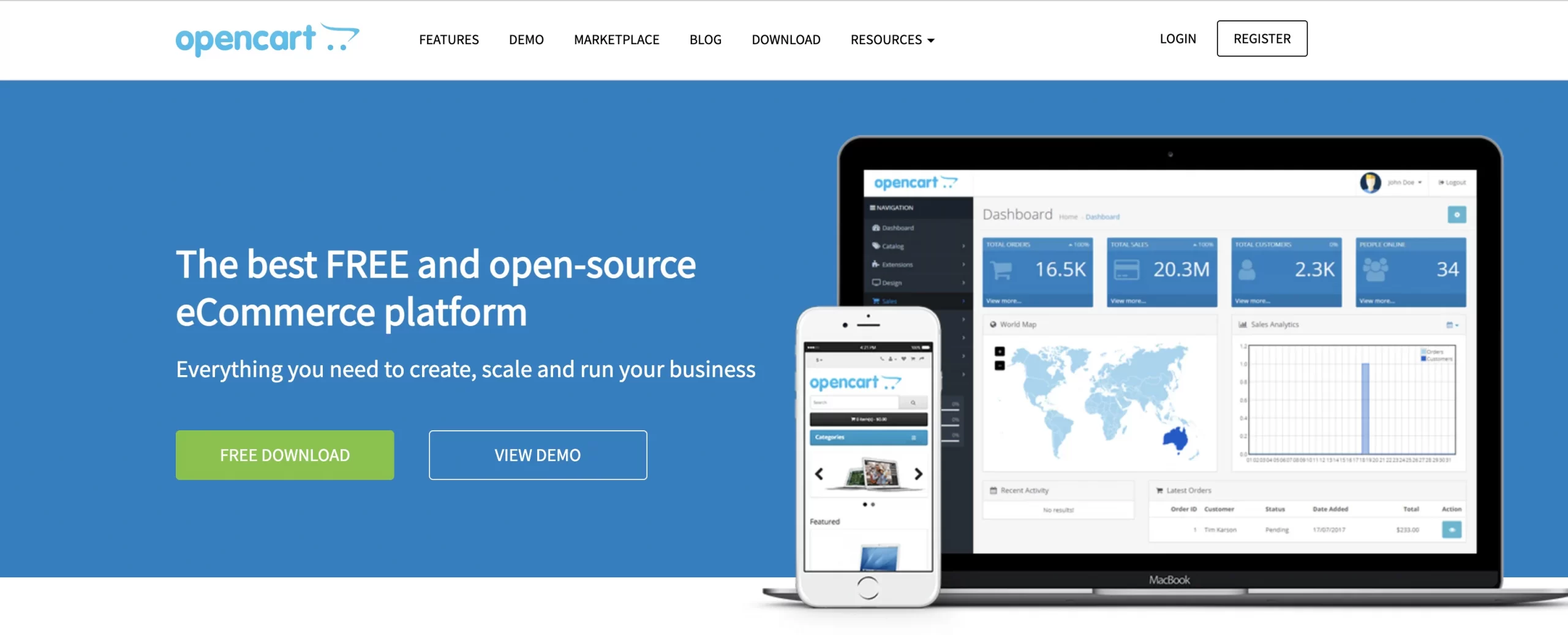
One of the main advantages of OpenCart is that it is free to use, giving businesses a low-cost entry into the world of eCommerce. However, while it’s easy to get started, businesses can also customize the platform with additional modules and themes to suit their specific needs.
Core strengths of OpenCart:
- OpenCart is free to use and open-source, which means you can avoid big licensing fees. However, you might need to invest in hosting and some extensions.
- As an open-source platform, OpenCart allows for extensive customization.
- It has a straightforward interface that is relatively easy to navigate, even for users without technical backgrounds.
- OpenCart has a wide range of extensions and themes available, allowing you to enhance and personalize your store.
Why OpenCart is among the best Shopware alternatives?
OpenCart stands out as a top alternative to Shopware because of its open-source nature and flexibility, which appeal to businesses seeking an affordable yet customizable solution. Similar to Shopware, OpenCart offers a modular approach, allowing users to add new functionalities as their needs evolve. However, OpenCart is more accessible for businesses that don’t require extensive technical expertise. It offers a simpler interface and a more cost-effective solution, making it a strong contender for businesses that prioritize ease of use over advanced features.
While it may not be as feature-rich as Shopware in terms of out-of-the-box functionality, OpenCart provides an excellent balance of usability, flexibility, and cost, making it an ideal alternative for many users.
However, consider these factors:
- Customizing the platform or integrating complex features may require some technical knowledge.
- As an open-source platform, you might need to rely on community forums or hire developers for help.
OpenCart pricing: Flexible based on your settings
Our recommendations for OpenCart:
- Best for: Businesses looking for a customizable, cost-effective eCommerce solution with flexibility for personalizing the store.
- Not recommended for: Businesses needing extensive built-in features or high technical support and scalability levels.
11. Wix
Category: Cloud-Based, SaaS (Software as a Service)
Users' ratings on Wix: 4.2/5 on G2
If you prioritize ease of use, I highly suggest trying Wix eCommerce. Started as a platform for building websites, Wix has evolved to include full-fledged eCommerce features, making it an appealing option for businesses looking to launch an online store quickly.

Wix is known for its drag-and-drop interface, which allows users to design a website without the need for coding knowledge. This makes it particularly appealing to beginners and small business owners who may not have technical expertise but still want to create a professional-looking store.
Core strengths of Wix:
- Wix has an intuitive drag-and-drop interface for anyone without the technical skills to create and manage their online store.
- Wix includes built-in eCommerce tools like payment processing, inventory management, and marketing features.
Why Wix is among the best Shopware alternatives?
Wix stands out as a top alternative to Shopware due to its simplicity and ease of use, making it a perfect choice for users with minimal technical experience. Unlike Shopware, which is a more customizable and feature-rich platform suitable for developers and larger businesses, Wix allows users to set up their online store quickly with no need for coding. This makes it an excellent option for small businesses, solopreneurs, or those who need a fast, affordable, and easy-to-manage solution.
With a wide range of pre-built templates, a drag-and-drop editor, and integrated eCommerce features, it is a practical solution for businesses looking to focus on products and customers rather than technical setup and design.
However, consider these factors:
- Wix may not offer the advanced features or flexibility that Shopware provides, especially for larger or more complex stores.
- Although Wix is flexible, it might not provide the same level of customization as Shopware, particularly for users needing particular features or integrations.
Wix pricing: From $17 to $159 per month
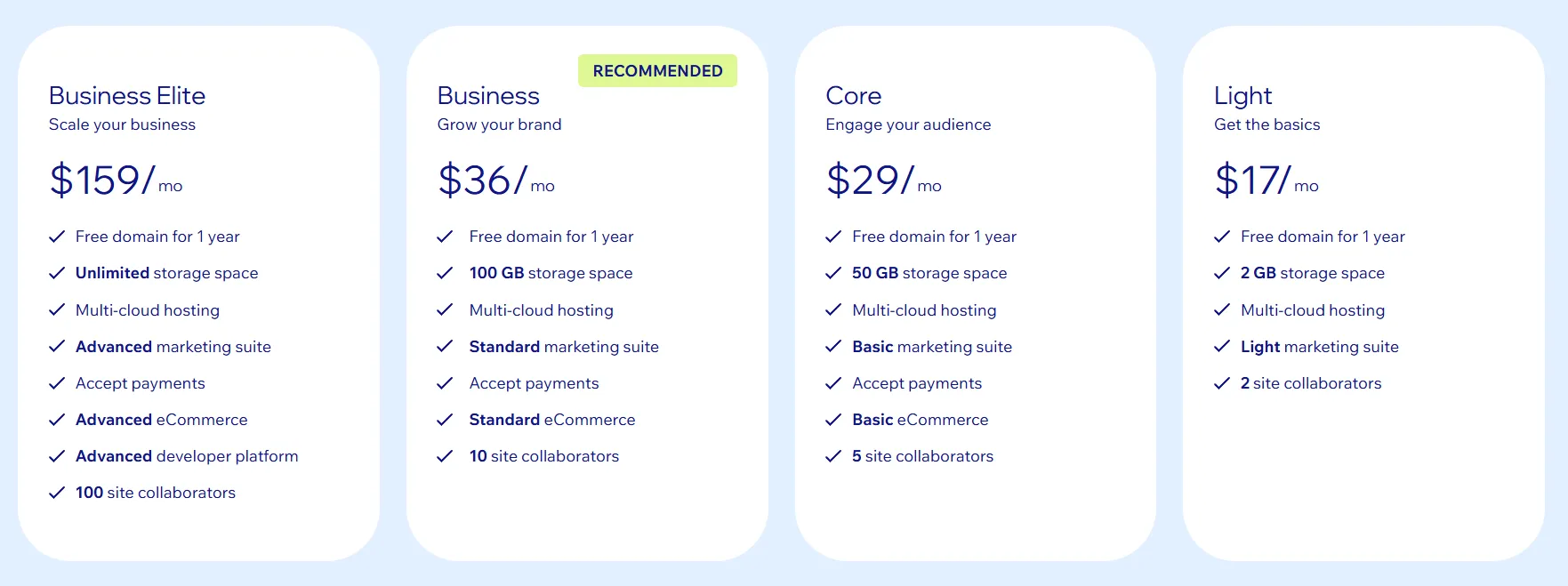
Our recommendations for Wix:
- Best for: Small to medium-sized businesses or individuals looking for an easy-to-use, cost-effective eCommerce platform with strong design capabilities.
- Not recommended for: Larger businesses or those needing advanced features, high scalability, or extensive customization options.
12. nopCommerce
Category: Open-source
Users' ratings on nopCommerce: 4.4/5 on G2
nopCommerce is a free, open-source eCommerce platform that provides an impressive range of features, making it a viable Shopware alternative for businesses of various sizes. Designed for flexibility and scalability, nopCommerce enables businesses to create highly customized online stores without the need for expensive licenses or subscriptions. It is built on the Microsoft .NET framework, which provides a solid and secure foundation for developers and businesses alike.
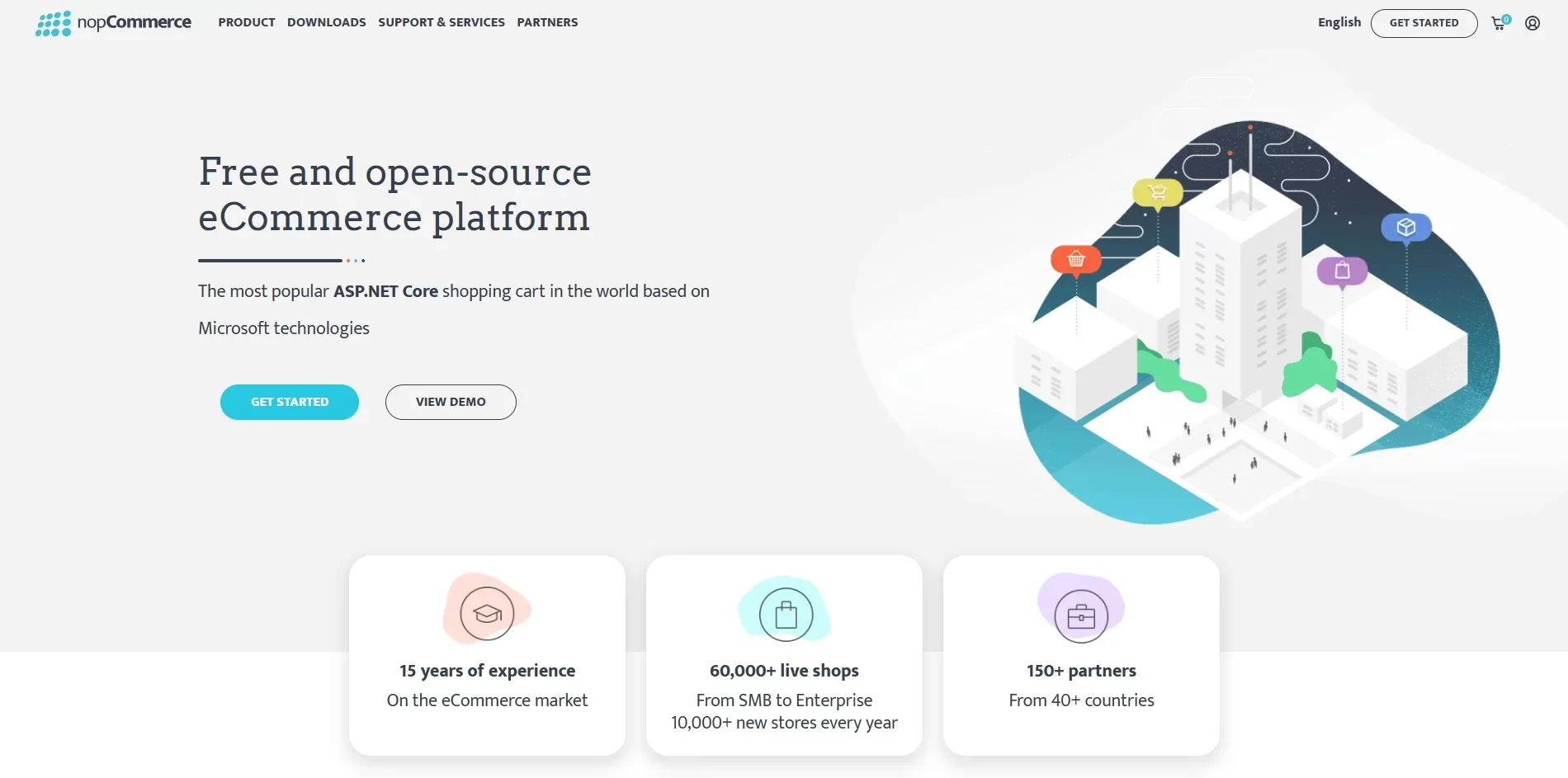
Despite its steep learning curve, nopCommerce’s extensibility and active community make it a great option for businesses looking for an open-source solution that can be tailored to their needs.
Core strengths of nopCommerce:
- You can modify the code, create custom features, and integrate various plugins to your needs.
- nopCommerce has robust built-in features, including multi-store support, SEO tools, and advanced inventory management.
- It’s designed to handle large stores and high traffic volumes, making it suitable for growing businesses.
Why nopCommerce is among the best Shopware alternatives?
nopCommerce is an excellent alternative to Shopware for businesses that are looking for an open-source platform that can be fully customized to their specifications. While Shopware is also open-source, nopCommerce provides a unique advantage with its .NET foundation, offering a more secure and stable environment for businesses. It is ideal for companies that require flexibility and scalability but don’t have the budget for proprietary solutions like Shopware’s enterprise offerings.
However, consider these factors:
- Users without technical skills might find the nopCommerce installation process challenging.
- You might need to rely on community forums or hire developers for help.
- The interface may not be user-friendly.
nopCommerce pricing: Flexible based on your settings
Cost Area | Estimated Cost | Notes |
Software License | $0 | nopCommerce is open-source |
Hosting | $10–$150/month | Varies based on traffic and provider |
Development/Setup | $500–$5,000+ (one-time or hourly) | Depends on custom work or agency fees |
Themes & Plugins | $0–$300+ | Available from third-party vendors |
Premium Support | Depends | Optional service from nopCommerce team |
Maintenance & Updates | Varies (in-house or external) | Technical knowledge required if DIY |
Our recommendations for nopCommerce:
- Best for: Businesses looking for a customizable, cost-effective eCommerce platform with robust features and scalability.
- Not recommended for: Users seeking an easy-to-use, out-of-the-box solution without extensive customization or technical setup.
Criteria to Consider When Choosing A Shopware Alternative
When selecting a Shopware alternative, it’s important to evaluate multiple factors to ensure the platform meets your business needs. Choosing the right eCommerce solution goes beyond features; it requires understanding your technical capabilities, budget, growth plans, and customer experience goals. Below are the key criteria to consider when selecting an alternative to Shopware:
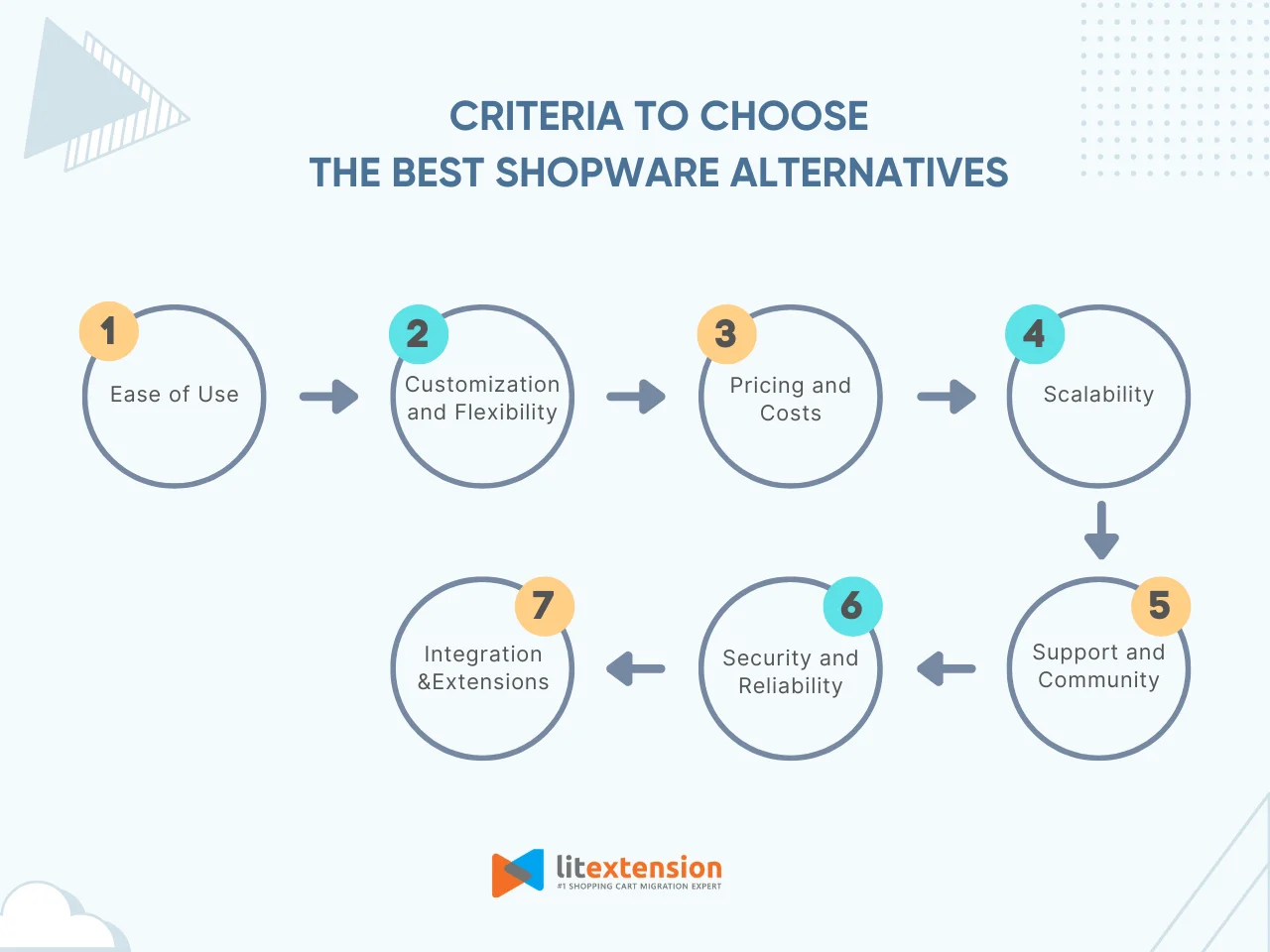
- Ease of use: Consider how intuitive the platform is for both you and your team, including store setup, product management, and order processing.
- Customization and flexibility: Evaluate how easily you can modify the platform to match your brand, add features, or integrate third-party tools.
- Pricing and costs: Look at the overall cost, including licensing fees, transaction fees, extensions, hosting, and potential development costs.
- Scalability: Assess whether the platform can grow with your business, handling higher traffic, additional products, or more complex operations.
- Integrations and extensions: Check the availability of plugins, apps, and integrations for payments, shipping, marketing, and analytics.
- Security and reliability: Ensure the platform provides strong security measures, data protection, and a stable environment for your online store.
- Support and community: Consider the quality of customer support, documentation, tutorials, and community resources available for troubleshooting and learning.
By keeping these criteria in mind, you can make a well-informed choice and select a Shopware alternative that aligns with your business goals and technical requirements.
Our Methodology
To provide a comprehensive and unbiased comparison of Shopware alternatives, we used a clear and structured approach to evaluate each platform. Our goal was to help businesses find the right solution based on their unique needs, whether they are small startups, growing enterprises, or large organizations.
Here's how we create this article on Shopware alternatives:
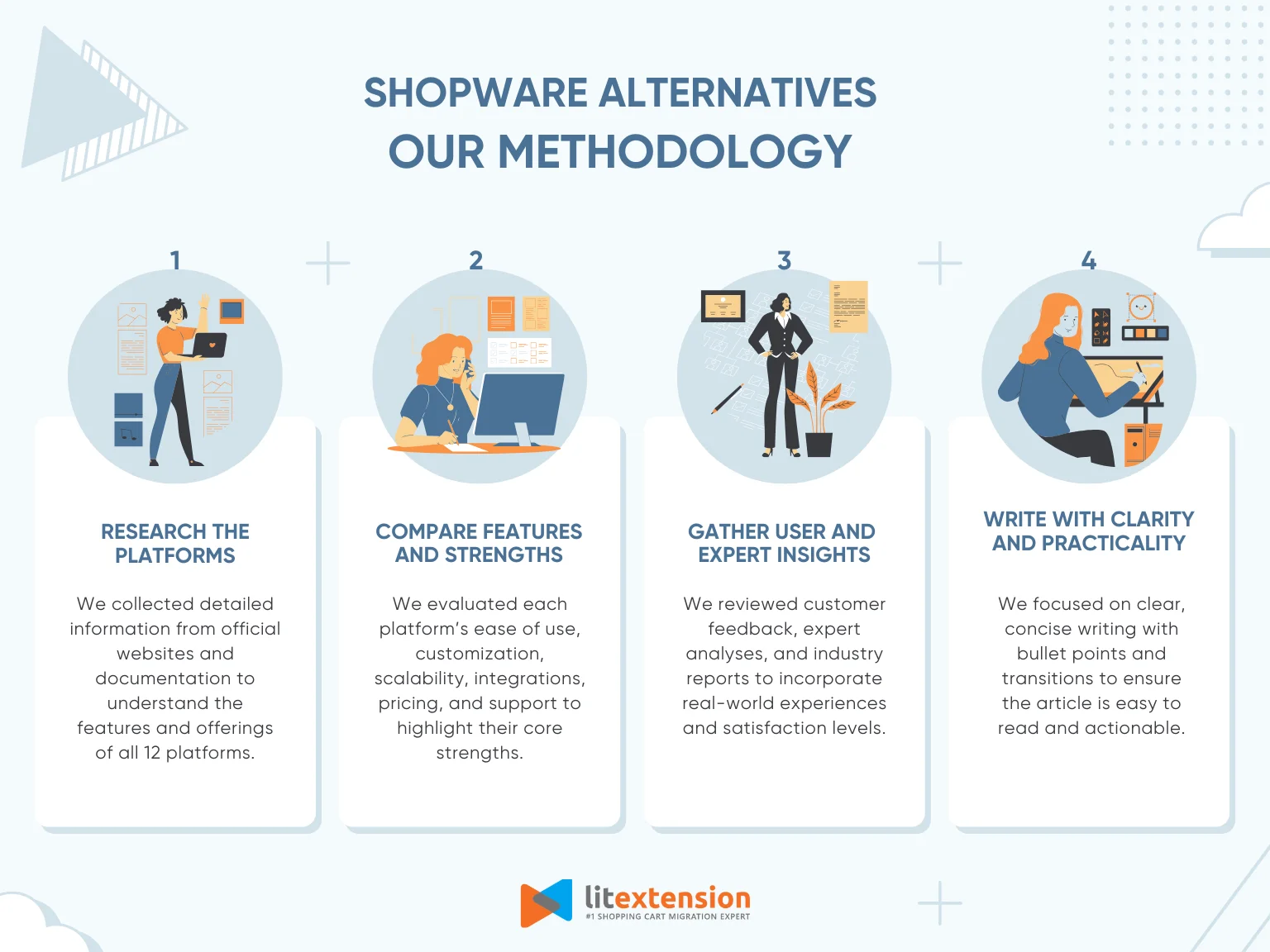
1. Research the platforms
We started by gathering detailed information on each eCommerce platform in the outline, including Shopify, BigCommerce, Salesforce Commerce Cloud, Ecwid, WooCommerce, Adobe Commerce (Magento), PrestaShop, Drupal Commerce, commercetools, OpenCart, Wix, and nopCommerce. We reviewed official product websites, documentation, and feature lists to understand what each platform offers out of the box.
2. Compare features and strengths
Next, we analyzed the core strengths of each platform. This included assessing factors such as ease of use, customization options, scalability, integrations, pricing, and support. For each platform, we identified the unique features that make it stand out, as well as any limitations or challenges.
3. Gather user and expert insights
We incorporated insights from customer reviews, expert analyses, and industry reports. This step allowed us to consider real-world experiences, common pain points, and user satisfaction. By combining both technical data and user feedback, we ensured that our comparisons reflect practical usage, not just theoretical capabilities.
4. Write with clarity and practicality
Finally, we focused on writing clear, concise paragraphs and actionable insights. We used bullet points where appropriate for readability, included transition sentences to maintain flow, and avoided unnecessary jargon to ensure the article is accessible to both beginners and experienced eCommerce users.
Shopware Alternative – FAQs
Is Shopware 6 free?
Shopware 6 offers a free version known as Shopware Community Edition (CE), which is open-source and allows businesses to use the core platform without any licensing fees. However, it’s important to note that while the Community Edition is free, Shopware also offers paid versions like Shopware Professional and Shopware Enterprise, which come with additional features, dedicated support, and enhanced scalability options. These paid versions are designed for businesses with more complex needs or those requiring advanced functionalities and services.
Is Shopware PHP based?
Yes, Shopware is a PHP-based eCommerce platform. It is built on the Symfony framework, which is a popular PHP framework for web development. This allows developers familiar with PHP to easily work with Shopware, customize it, and extend its functionality to meet specific business requirements.
Is Shopware open-source?
Yes, Shopware is open-source. The platform’s Community Edition (CE) is completely open-source, meaning businesses can download and modify the source code to suit their specific needs. This gives companies complete control over their store’s functionality and design.
What are the best Shopware competitors?
There are many strong competitors to Shopware, each offering unique features and benefits depending on the needs of your business. Here are the top 12 Shopware alternatives in our opinion:
1. Shopify
2. BigCommerce
3. Salesforce Commerce Cloud
4. commercetools
5. Ecwid
6. WooCommerce
7. Adobe Commerce (or Magento)
8. PrestaShop
9. Drupal Commerce
10. OpenCart
11. Wix
12. nopCommerce
Each of these platforms offers unique strengths, and the best choice depends on your business size, technical expertise, budget, and customization needs.
Final Words
In this guide, we have explored the top Shopware alternatives that cater to different business requirements. From user-friendly options like Shopify, which is perfect for beginners, to highly customizable platforms like Magento Open Source and commercetools for tech-savvy teams, we’ve got you covered. Whether you're on a tight budget, need advanced integrations, or are ready to scale globally, this list will help you find the best fit for your eCommerce journey.
Last but no least, for more eCommerce platform insights, visit LitExtension Blog and our eCommerce community to gain more understanding and connect with numerous eCommerce users and experts.

